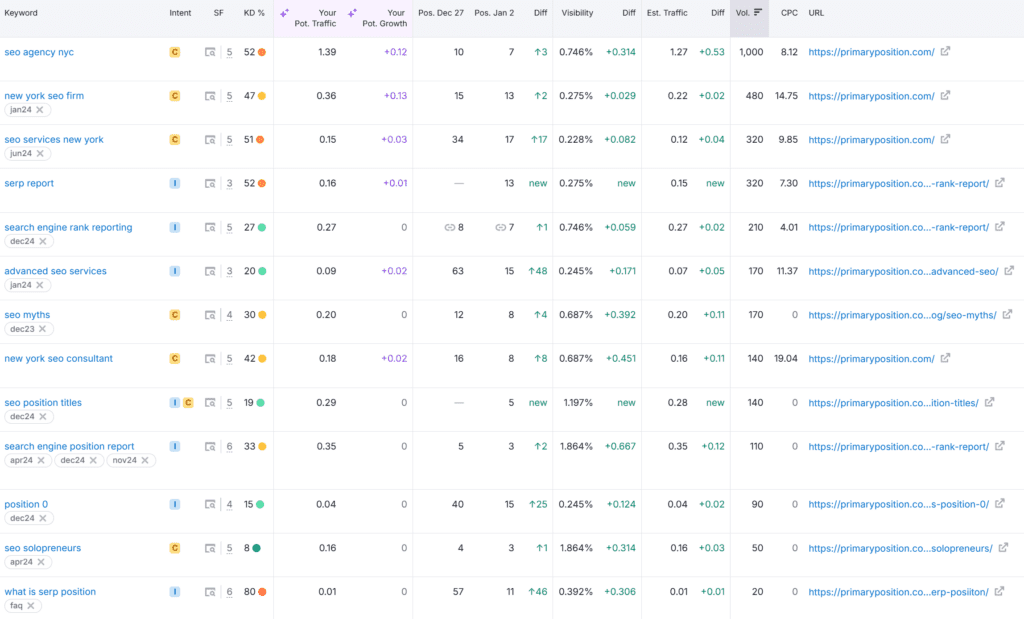In the world of SEO Marketing, Search Engine Ranking Reports remain a cornerstone of a Google SEO strategy because they perform the tedious task of tracking the Search Engine Position ranking for each keyword. With over two decades of experience in the field, I’ve witnessed the transformation of these reports from simple keyword lists to sophisticated analytical tools. Let’s dive deep into the world of SERP reports and uncover their true potential.
Table of Contents
ToggleWhat is a Search Engine Position Report?
In the realm of SEO marketing, a Search Engine Ranking Report, often referred to as a “SERP report,” is a comprehensive analysis of keyword rank positions in search engine results. These reports typically showcase a curated list of keywords, meticulously selected by SEO managers, and their corresponding rankings across various search engines. It’s worth noting that the vast majority of SERP reports are generated automatically using industry-standard SEO tools such as SEMrush, Ahrefs, Moz, or SE Ranking. This automation ensures consistency and allows for real-time tracking of ranking fluctuations.
SEO Ranking Report
An SEO Ranking Report and a SERP Report are closely related but serve slightly different purposes within the context of search engine optimization
Terminology: SERP Report vs. Search Engine Position Report
While “Search Engine Ranking Report” is a term frequently used in professional settings, it’s essentially interchangeable with “SERP Report.” The former is a more descriptive version, often shortened to “Search Engine Rankings” or “Search Engine Ranking Report” in common SEO and digital marketing parlance. Tracking SERPs is a term for constantly checking one’s domain ranking in search engines.
Decoding a Search Engine Position Report
At its core, a Search Engine Ranking Report provides insights into where a website ranks for a predetermined set of keywords across various search engines. These keywords are typically derived from extensive keyword research for SEO, often referred to as a “Keyword Universe” in SEO circles.
Search Ranking Reports
Keyword level data includes
- Positions of your targeted keywords in SERPs
- Changes in rankings over time
- Rankings across different devices (desktop and mobile)
- Rankings for various search engines (Google, Bing, Yandex and others)
Track your presence in various SERP features:
- Featured snippets
- Local packs
- Image carousels
- Video results
- People Also Ask boxes
Interpreting Search Engine Position Reports
When analyzing these reports, SEO professionals primarily focus on two key metrics:
- Average Position (High Accuracy)
- Visibility (Variable Accuracy)
Search Engine Rank Reports: Average Position
While average position provides a precise snapshot of rankings, it’s crucial to remember that not all keywords are created equal. Some may have significant search volume, while others might be rarely queried. Savvy SEO managers should be wary of reports padded with high-ranking but low-traffic keywords, as these can paint an overly optimistic picture of a site’s performance.
Search Engine Rank Reports: Visibility
Visibility reports attempt to estimate potential traffic and click-through rates (CTR) based on rank positions and search volume. However, their accuracy can vary significantly, especially for niche B2B terms or keywords with limited Google Ads data.
Search Engine Rank Report Example
This is an example of an SEO agency domain in a Search Engine Rank Report:

Advanced Features of SERP Reporting Tools
Modern SERP reporting tools offer a plethora of advanced features, including:
- Historical ranking data and trend analysis
- Keyword categorization and tagging
- Keyword distribution analysis, typically segmented into:
-
S
- Page 1 (Top 10)
- Top 20
- Top 50
- Top 100
-
These granular insights allow SEO professionals to track progress towards specific ranking goals effectively.
Search Engine Ranking Report Software
By leveraging tags or keyword filters within your SERP reporting software, you can create bespoke branded search reports. This functionality is invaluable for monitoring your brand’s online presence and competitive positioning.
search engine ranking report software examples
Tools like SEMRush, Ahrefs, SE Ranking are good examples of Search Enigne Ranking Report Software
Synergizing Keyword Research and SERP Reports
To maximize the efficacy of SERP reports, it’s crucial to base them on well-researched keywords that:
- Demonstrate high conversion rates
- Align with your PPC strategy
- Fall within the search patterns of your Ideal Customer Profile (ICP)
- Are targeted by your competitors
Tracking Progress and Performance with SER reports
To gauge the success of your SEO efforts, focus on two key metrics over time:
- Growth in average position
- Improvements in average visibility
This dual-sided approach ensures you’re not just climbing the rankings, but doing so for keywords that drive meaningful traffic and conversions.
Integrating SERP Reports into Your SEO KPI Dashboard
For a holistic view of your SEO performance, it’s essential to incorporate SERP report data into your monthly SEO Report Templates. This integration allows for a comprehensive analysis of your search engine optimization efforts and their impact on overall business objectives.





